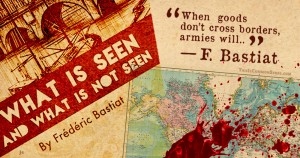A lot of people were impressed by the reasonableness of Donald Trump’s foreign policy speech yesterday … despite the usual hyperbolic promises of “best” and “great” and “beautifully.”
Its general tenor? Refreshing. Rejecting post-Cold War foreign policy for a return to “national interest” and “America first”? Long overdue. Like Trump, I think we should eschew nation building.
But still there is that one big problem: Trump is a mercantilist. He believes in protectionism. He thinks that trade has to be “fair” in order to benefit both participants. He thinks NAFTA and similar trade agreements (which generally promoted trade while still reserving a lot of room for government futzing about) are what hurt American industry. Trump is always blaming the “bad deals” made with Mexico and China, rather than placing the blame where it squarely belongs, on
- America’s world-high corporate income tax, and
- chaos of regulatory excess, and
- impenetrable tax code.
But protectionism makes sense to a lot of people. They are incredulous when they hear the (well-established) idea that free trade — even unilateral free trade — is a benefit to the people who live under it.
Surely, they snort, when you target aid or protection to some industries, you are doing good, right?
Wrong. Oh, yeah, of course protectionism protects the chosen few, the advantaged. That’s what it obviously does. But it doesn’t protect the general interest – consumers pay more and producers allocate resources to less valued uses.
You have to look beyond the obvious (“the seen”) to get the full picture (“the unseen”).
Trump’s at his most dangerous right here — forget his loose talk — by continuing to pretend that protectionism helps America.
We cannot afford another Smoot-Hawley.
This is Common Sense. I’m Paul Jacob.
Common Sense Needs Your Help!
Also, please consider showing your appreciation by dropping something in our tip jar (this link will take you to the Citizens in Charge donation page… and your contribution will go to the support of the Common Sense website). Maintaining this site takes time and money.
Your help in spreading the message of common sense and liberty is very much appreciated!

